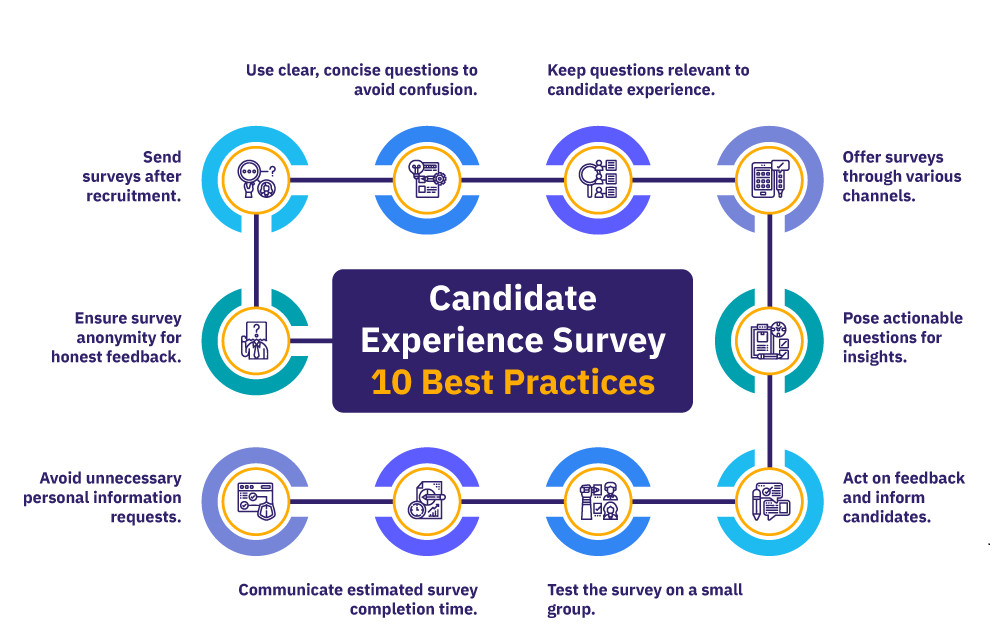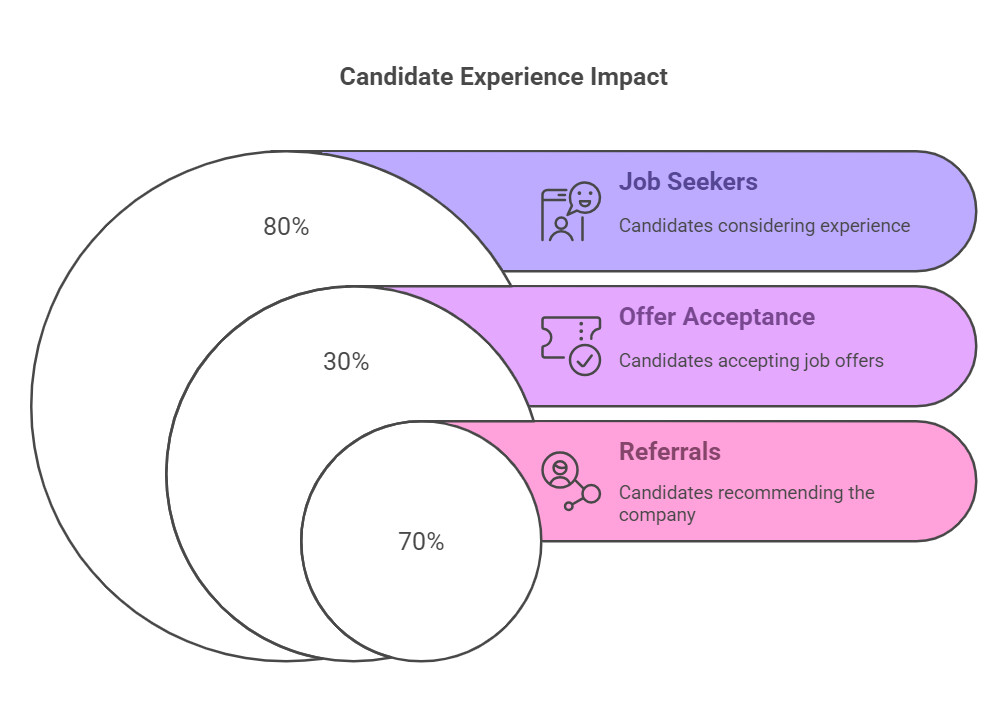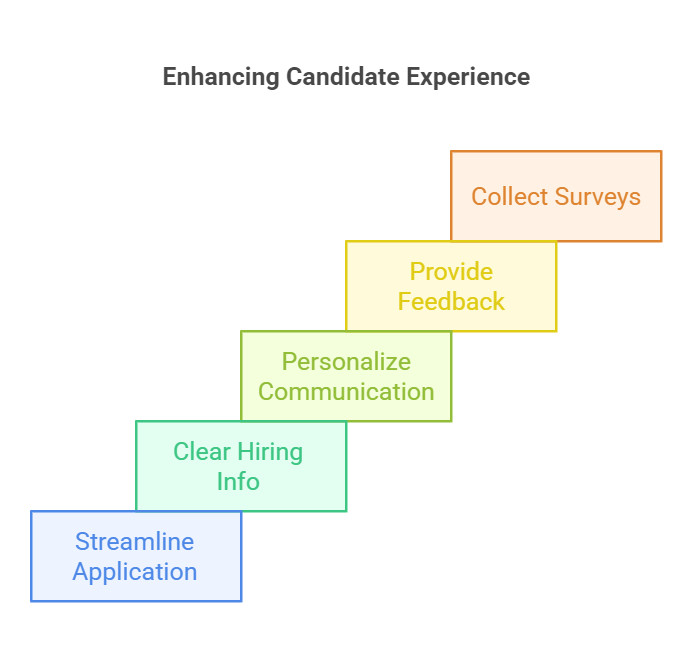- Research platform
Sources of information
Data analysis
Actions
- Solutions
For whom
Problems / Issues
- Materials
Materials
- About us
About us

Today’s job market is competitive. Candidate experience is key in the recruitment process. So, what is candidate experience? It signifies how job seekers view their engagement with a company during hiring. This includes the job application, interviews, and decisions made. Candidate experience matters for attracting talent and bolsters your employer brand. This post explores the importance of candidate experience and highlights best practices for improving recruitment candidate experience. Mistakes made during the hiring journey can leave candidates with a negative impression. We’ll also look at candidate experience survey and their role in helping to refine your hiring approach. Feedback can make your recruitment process smoother and more appealing to every candidate. A satisfying candidate experience can lead to better hiring outcomes. In this blog, you will find tips and insights to enhance every aspect of the hiring journey. Understanding candidate experience needs to be a priority to improve the candidate experience. Let’s get started on enhancing your recruitment strategy!
Candidate experience encompasses all interactions and feelings a job seeker has with a company during recruitment. It starts when a person learns about a job and continues through the application, interviews, and follow-ups. Each point of contact builds an experience that impacts how candidates view the company.
The need for a positive candidate experience is clear. Good experiences boost employer branding and convert potential applicants into hires. Around 75% of job seekers say positive experience matters in their choice of where to apply. Companies focusing on enhancing a candidate's experience often have higher job offer acceptance rates, highlighting its role in recruitment.
Furthermore, candidate experience affects a firm’s reputation. Negative experiences often lead to sharing of those feelings. Roughly 60% of candidates say they would inform others about their dissatisfaction. Companies must see that the recruitment candidate experience shapes their market image, affecting future hiring efforts.
To enhance candidate experience, organizations should assess every stage of the recruitment process. It should be informative, respectful, and engaging. Candidates appreciate their time is valued, so clear, supportive recruitment strategies can improve their overall perception drastically.
As we explore candidate experience further, it’s important to see its role, not just for candidates, but for organizations too. They aim for efficient and effective recruitment strategies aligned with positive outcomes.
The world of recruitment has changed a lot. Candidate experience now is central to hiring and keeping top talent. A good candidate experience boosts how job seekers view a company. It's also key for building an employer brand. Respectful treatment and a smooth recruitment process shows a company's core values.
Data shows companies with a strong candidate experience are seen more favorably by potential hires. Around 80% of job hunters think about the candidate experience when looking at employers. This focus affects employer branding. A fluid, engaging recruitment process displays a company's culture and values, making it appealing to quality candidates.
Also, good experiences in recruitment candidate experience lead to greater satisfaction. Candidates who have a good journey often accept job offers. Some studies show 30% higher acceptance when candidates enjoy their time during recruitment. This also helps retention since candidates who like the hiring process are more stable in their positions.
Furthermore, companies that value candidate experience usually see more referrals. Candidates that have good experiences—whether they get the job or not—tend to talk about it. This kind of word-of-mouth can widen the applicant pool and improve the company's reputation in the market. Nearly 70% of candidates who feel well-treated during applications likely recommend the company, making it a strong piece of recruitment strategy.
In conclusion, putting effort into candidate experience is vital for improving employer branding. It also raises candidate satisfaction and retention while encouraging referrals. Knowing how to improve this experience is key as we look at common problems in candidate experience that could limit these gains.

Many organizations face barriers in candidate experience. One main issue is the lack of clear communication during recruitment. Candidates often feel uninformed about their status. A high 71% of candidates want updates within a week of applying. When this doesn’t happen, candidates can become frustrated and lose interest.
Another concern is the long and complex job application process. Candidates deal with several evaluation stages that can drag on. This timeline can push qualified applicants away. Research shows over 60% of candidates abandon applications due to too many questions or unclear steps. Simplifying these processes keeps applicants interested.
Vague job descriptions add to discomfort in candidate experience. When postings do not specify responsibilities, candidates may apply only to discover poor alignment with their skills. This can elevate turnover rates post-hire as employees find out they aren’t suitable. Writing accurate job descriptions attracts suitable candidates and lowers mismatches.
Resolving these issues is key for organizations to better their recruitment candidate experience. By enhancing communication, simplifying the application, and crafting clear job descriptions, firms can enrich candidate interactions. This leads to a stronger talent pool and improved hiring.
As we examine these hurdles, implementing best practices is essential. The next section will explore specific strategies to bolster candidate experience and promote better interactions during hiring.
Crafting effective job descriptions is crucial in attracting the right candidates and enhancing the candidate experience. A well-written job description should clearly outline the job responsibilities, requirements, and expectations. This clarity helps candidates determine if they are a good fit for the role and the company, reducing mismatches and improving overall satisfaction.
Moreover, job descriptions should provide insight into the company culture and values. This not only helps candidates understand what it’s like to work at the company but also aligns their expectations with the company’s ethos. Including details about the company’s culture can attract candidates who resonate with these values, leading to a more engaged and motivated workforce.
Effective job descriptions are a cornerstone of a positive candidate experience. They set the stage for transparent and honest communication, ensuring that candidates are well-informed and prepared for the recruitment process. By investing time in crafting detailed and accurate job descriptions, companies can attract top talent and foster a positive candidate experience from the very beginning.
Streamlining the application process is essential in improving the candidate experience. A lengthy and complicated application process can deter candidates and harm the company’s reputation. In today’s fast-paced job market, candidates expect a smooth and efficient application process that respects their time and effort.
To enhance the candidate experience, companies should focus on simplifying the application process. This can be achieved by reducing the number of steps involved in submitting an application and ensuring that the process is user-friendly. Implementing mobile-friendly application platforms can also make it easier for candidates to apply, increasing the likelihood of attracting top talent.
Additionally, providing clear instructions and setting realistic expectations about the application timeline can help keep candidates engaged. By making the application process easy and accessible, companies can not only attract more qualified candidates but also leave a positive impression that reflects well on their employer brand.
To boost candidate experience in the recruitment process, companies need to utilize best practices. These methods refine hiring and improve the employer brand. Here’s a look at best practices that enhance recruitment candidate experience:
Applying these best practices can improve candidate experience markedly. They not only aid in drawing top talent but also improve the company’s reputation in a tough job market. As an important next step, focus on implementing candidate experience surveys to gain actionable insights for ongoing growth.

Implementing candidate experience surveys can help gather feedback from applicants during the recruitment process. These surveys are essential for organizations to understand how candidates view their hiring methods. Insights from applicants can reveal what’s working and which areas require improvement for both the candidate and the employer.
Candidate experience surveys offer valuable insights into the ups and downs of hiring processes. Surveys pinpoint touchpoints where candidates experience disconnections, such as during application, interview scheduling, or feedback delivery. This feedback enables organizations to make informed decisions to boost the candidate experience.
Survey data supports organizations in refining strategies to boost candidate satisfaction. For instance, organizations actively seeking feedback see 70% satisfaction among candidates after making suggested adjustments. This forward-thinking tactic enhances candidate experiences, enhancing their reputation to attract top talent. Moreover, when organizations prioritize candidate feedback, they often see a 28% rise in engagement and retention.
By effectively using candidate experience surveys, companies can improve their recruitment process into seamless experiences for candidates. This impacts short-term hiring successes and builds a strong employer brand.
As we explore this topic, it’s clear feedback is crucial in improving the candidate journey. Understanding how to use data from surveys can help organizations elevate their recruitment candidate experience.
Feedback plays a big role in improving the candidate experience in recruitment. Encouraging candidates to share their positive experiences reveals pain points and shows what needs fixes. When candidates feel valued, it improves the recruitment process and bonds them closer to the employer. This creates engagement from the beginning.
Acting on candidate feedback quickly is key to building a nice hiring atmosphere. This shows candidates that their thoughts matter and are acted on. Such practices make candidates feel like they are important parts of recruitment, not just applicants. Therefore, a company focusing on candidate feedback creates an environment of trust, improving its employer brand.
Using candidate experience surveys right after hiring is a smart method to improve recruitment candidate experience. These surveys help gather insights from candidates about their hiring journeys. By collecting this data, organizations can make better decisions that enhance experiences for the next candidates. A good feedback loop is essential so candidates see results from their input.
In summary, using feedback methods helps find areas for improvement and shows a commitment to valuable candidate experience. By providing candidates a way to share ideas, organizations can uplift their recruitment candidate experience. This can attract better talent in a competitive job market.
In summary, candidate experience plays a key role in recruitment strategy. Every interaction matters, from the first application to final interview. When prioritizing this, employers can improve their reputation and boost hiring outcomes.
We looked into common issues affecting the recruitment candidate experience. Also, best practices can simple be put into place. Using candidate experience surveys is a great way to gather insights on processes, letting you refine your approach over time. Feedback not only helps improve but shows candidates that their thoughts are valued.
Now is time for action. Use insights from this article to evaluate and enhance your strategies in recruitment. Focusing on candidate experience sets a positive tone, attracting top talents and building loyalty and engagement. A good candidate experience matters greatly in today’s job market.
The candidate experience has a significant impact on employer branding. A positive candidate experience can enhance the company’s reputation and attract top talent, while a negative candidate experience can harm the company’s reputation and deter candidates. In a competitive job market, how candidates perceive their interactions with a company can make or break the employer brand.
A positive candidate experience showcases the company’s commitment to treating candidates with respect and transparency. This can lead to higher job offer acceptance rates and increased referrals, as satisfied candidates are more likely to recommend the company to others. On the other hand, a negative candidate experience can lead to negative reviews and a tarnished reputation, making it harder to attract quality candidates in the future.
By prioritizing the candidate experience, companies can build a strong employer brand that stands out in the market. This involves not only improving the recruitment process but also ensuring that every interaction with candidates reflects the company’s values and culture. A strong employer brand, bolstered by positive candidate experiences, can be a powerful tool in attracting and retaining top talent.
Leveraging technology is essential in enhancing the candidate experience. By using the latest recruitment technology, companies can streamline the application process, improve communication, and provide a more personalized experience for candidates. In an era where technology is integral to daily life, incorporating it into the recruitment process can significantly improve efficiency and satisfaction.
Modern recruitment technologies, such as applicant tracking systems (ATS) and AI-driven tools, can automate repetitive tasks and provide real-time updates to candidates. This not only speeds up the application process but also ensures that candidates are kept informed about their status, reducing uncertainty and frustration.
Furthermore, technology can facilitate personalized communication with candidates. Automated emails and chatbots can provide timely responses to candidate inquiries, while data analytics can help tailor interactions based on individual candidate profiles. This level of personalization makes candidates feel valued and appreciated, enhancing their overall experience.
By embracing technology, companies can transform their recruitment processes into seamless and engaging experiences for candidates. This not only improves short-term hiring outcomes but also builds a strong employer brand that attracts top talent in a competitive job market.
Copyright © 2023. YourCX. All rights reserved — Design by Proformat